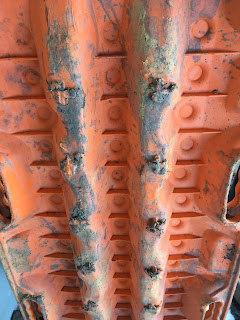A few years ago I
started looking into traction aids a little closer. I liked the idea and concepts in select
situations. After putting my hands on a
set I started to see some potential in different situations. I had bought a set
of cheaper style ramps. They worked well
but the more I used them the more they deteriorated. I did however see some benefits and wanted to
keep my traction aid search going. So I
reached out to Maxtrax and I received the set in a short amount of time.
First thing I noticed was the quality
difference, strong, yet flexible. The
uses and benefits kept going through my mind.
I started using the ramps in small instances of needed traction and
while they work well I noticed there are a few situations that are not
“Traction Aid” traditional that Maxtrax excel at. For example, you have a
series of depressions or wash outs that test the limits of articulation of a
certain vehicle. Place a rock in the wash
out (Don’t fill the hole as before) and lay the Maxtrax over it. You just created an efficient bridge as the
vehicle/driver overcome the challenge. The
Maxtrax flex and move with the vehicle weight but don’t break. This same situation can be used on hill
climbs and descents to keep the vehicle with traction.
In mud they work great to help pull a
vehicle out of a slippery situation by providing traction. We use them a lot to stay the course in ruts. If we want to get out of a rut we use the
ramps to allow the vehicle to climb. In
situations where vehicles are at risk of sliding into a certain position,
simply position the Maxtrax to stop the slide, keeping the vehicle and driver
safe.
Now when it comes
to snow things get a little tricky as it is a position thing. With our recent
snowfall on the east coast we had the perfect opportunity to put the Maxtrax to
the test in various snow situations.
Snow scenario,
you have found yourself with limited mobility due to the snow. Placing the
Maxtrax flat, in front of the tires won’t get much traction. However, if you place at a 45* angle against
the tire and they will obtain traction right away. Looking at the video of the testing, the
Maxtrax, when placed at the 45* angle will even raise the vehicle up and get
momentum as the ramps fall to the ground.
You can dig the snow out in front if needed with them like a shovel but
we find the raising effect really works to our advantage. We have also found that laying another ramp
on the ground sideways in front of the ramp allows for better lift because of
the weight distribution.
Here are a few videos showing how they help in the snow. First just
plain ramps in an area where front tires have snow in front and rears
are in tracks. Watch how quickly they fall into place and that there is
no spinning before climbing on the ramps. The Jeep raises up due to
the size of the ramps distributing the weight to keep the vehicle from
sinking into the deep snow.
This next video shows using a second pair of ramps to help distributing
the load even more. Watch how much it lifts the vehicle, which gives
it momentum and traction.
This
video show placing a log under the ramps because you may only have
two. This will help also but not as well as another set of ramps.
One thing to watch for with ramps is when
a spinning tire hits them you will begin to see some wear and tear. Off Road
Consulting utilizes the Maxtrax during the training classes and this is where
the product is really put to the test as some drivers don’t hold back! This
happens especially in a situation where the driver is intimidated and really
wants out of the situation. Since
obtaining our Maxtrax spring 2015, they have seen over 75 different sets of
tires and you can see the battle scars on our ramps. Our Maxtrax get used and abused more than the
average consumer and are used by multiple vehicle types and drivers.
Some drivers use
them gently and some are a little more aggressive. Our Maxtrax have been shot
out from under vehicles and hit with spinning tires countless times…...The
impressive feature about the Maxtrax though is while they are pushed to
extremes they keep working effectively
and efficiently.
Weighing is at
just 8 lbs, the Maxtrax are lightweight and the design allows for easy
storage. A few other advantages about
using the Maxtrax versus rock/log stacking is the overall physical strain that
lifting these heavy rocks can put on your back/knee etc. Another factor not
thought of but when lifting rocks you expose yourself to meeting creatures who
call the rock their home. Some of these creatures, depending on where you are
can be harmless such as earthworms or toads. However there is always of chance
of coming across a rattle snake or poisonous spider that can react if startled.
I had my
reservations with the traction aids but after them through thick mud, ruts,
deep holes, snow along with exposure to variety of drivers and vehicle types I
am quite impressed with the Maxtrax.
They have been
integrated into my training class curriculum and quickly became an essential
part of my recovery gear.
I’m always
learning new and alternative ways to use the Maxtrax and their versatility is
remarkable.
With any recovery
gear and recovery situation you must use extreme caution and take the proper
safety procedures and precautions.
My rock stacking
days are over and my skepticism has been replaced with a new appreciation for
the traction aid called Maxtrax.













